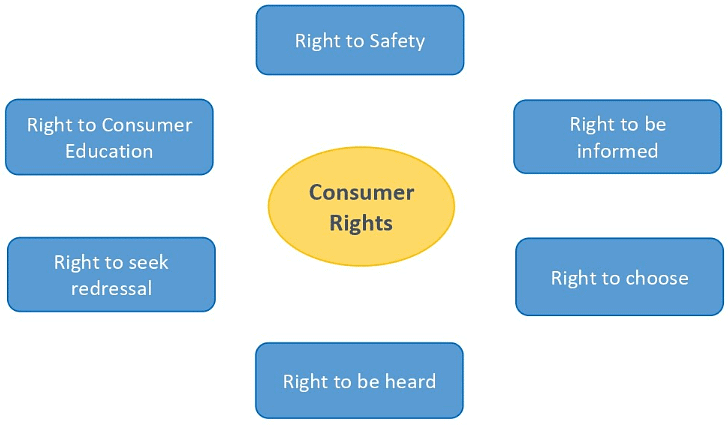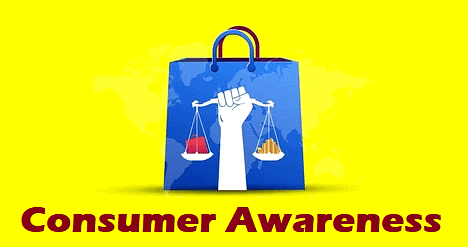UPSC Exam > UPSC Notes > Psychology for UPSC Optional (Notes) > Consumer Rights and Consumer Awareness
Consumer Rights and Consumer Awareness | Psychology for UPSC Optional (Notes) PDF Download
| Table of contents |

|
| Introduction |

|
| Who is a Consumer? |

|
| Consumer Rights |

|
| Consumer Awareness |

|
Introduction
In today's bustling economy, where buying and selling goods and services is a common practice, it is crucial to understand our rights as consumers and the level of protection we have against exploitation. While we are familiar with the rights bestowed upon us by the political realm, what rights do we possess in the economic world? How much awareness do we have about these rights and their implications? Let's delve into the realm of consumer rights and consumer awareness to shed light on this significant aspect of our lives.
Who is a Consumer?
Before we explore consumer rights, let's define who a consumer is. A consumer can be anyone who purchases or uses goods and services, whether they are derived from natural resources or are available in the market. According to the 1986 Consumer Protection Act, the term "consumer" is derived from the Latin word "Consumere," meaning to consume or to eat completely. A consumer engages in transactions involving goods or services, which may involve deferred payment systems or partial payments. In essence, if you are utilizing any product or service, you are a consumer.

Consumer Rights
Consumer rights are established to protect the interests of consumers. In today's society, consumer rights are not just mere concepts but are effectively implemented. Governments across the globe have taken the responsibility to disseminate knowledge about consumer rights. However, there is a disparity in consumer rights awareness between individuals in the Western world and those in developing countries like India, Sri Lanka, Bangladesh, and others. While the educated elite are well-informed about their consumer rights, the impoverished and less educated classes remain unaware of their entitlements. Let's take a closer look at some fundamental consumer rights:
- Right to Safety: With the advancement of technology, a wide range of goods and services flood the market. Ensuring their safe handling becomes crucial. Some products require technical expertise, and consumers need to know how to use them safely. Evaluating the safety features of goods and services may also require additional technical knowledge. The safety of products is of paramount importance to consumers, taking into account both immediate needs and urgent demands.
- Right to a Healthy Environment: This right emphasizes the importance of a physical environment that enhances one's quality of life. It encompasses protection against environmental hazards beyond individuals' control and recognizes the significance of preserving and improving the environment for present and future generations. Violations of the right to a healthy environment include issues such as contaminated groundwater, air pollution, ozone depletion, global warming, and increased toxic waste.
- Right to Information: Consumers have the right to accurate and sufficient information from public authorities regarding any developments, goods, and services. Transparent exchange of information between the people and development authorities is a crucial aspect of the right to information. Openness in the management and governance of society is necessary, and access to more information is vital to enhance the effectiveness of consumer groups and their operations.
- Right to Choose: Participation in national decision-making processes is essential for a democratic society. The freedom of choice grants consumers the right to select and purchase goods according to their preferences. Access to a wide range of products allows consumers to choose what best aligns with their desires and needs. In the absence of choice, consumers are left with limited options and may be forced to purchase products they do not necessarily desire.
- Right to Redress: When consumers face issues with the goods or services they have paid for, they have the right to seek redress. This entails a fair resolution of legitimate complaints. Consumers can file complaints when a product fails to meet expectations in terms of performance or quality. The right to redress empowers consumers to raise concerns about unfair trade practices, illegal activities, or unethical exploitation.
- Right to be Heard: The right to be heard ensures that consumers' interests are taken into full consideration when formulating and implementing monetary and other policies. It involves the participation of consumers in the development of goods, services, and policies. Individuals have the right to voice their opinions and contribute to matters concerning consumer welfare in various forums.
- Right to Consumer Education: Consumer education refers to acquiring the knowledge and skills necessary to make informed purchasing decisions throughout one's life. It encompasses access to information and skills required to take action and influence the factors that impact consumer decisions. Consumer education equips people with the necessary information to become globally aware consumers, taking into account environmental developments that affect their choices.
- Right to the Satisfaction of Basic Needs: Under this right, consumers are guaranteed access to essential products and services necessary for survival. Basic needs encompass food, clothing, shelter, healthcare, education, cleanliness, and more, depending on the culture and nation. In developing countries, basic needs may refer to sufficient food, clothing, and shelter, while in more developed regions, it may include access to high-quality goods and reliable services.
Consumer Awareness
- Being an informed consumer is crucial for safeguarding one's rights. Consumers should be aware of their rights, and sellers have a responsibility to inform them about these rights as responsible citizens, without exploiting them. Unfortunately, many cases of exploitation and fraud occur due to a lack of awareness among consumers. In the current market landscape, characterized by a multitude of goods and services, it has become increasingly challenging to identify genuine manufacturers or vendors.

- Interacting with producers or sellers face-to-face has become rare, as advancements in information technology have expanded the physical distance between consumers and suppliers. Consumers can now place orders over the phone or the internet, and products are delivered to their doorstep. However, this convenience has also made it difficult to determine the authenticity of certain items. Consumers often rely on advertisements to make their choices, assuming that a product featured in an advertisement must be reliable.
- Unfortunately, this is not always the case, as some adverts purposefully withhold information to mislead consumers. It is essential to be cautious and pay attention to vital information, such as expiration dates on packaged food and medications, to ensure consumer safety and well-being.
Conclusion
Consumer rights have been established to protect individuals from exploitation. In the cycle of demand and supply, we all possess basic consumer rights. However, many people remain unaware of these fundamental rights, making them vulnerable to deceit and fraud. Governments play a vital role in ensuring that every individual has the freedom to exercise their rights, and any attempt to hinder these rights is considered a punishable offense. It is crucial for both consumers and sellers to be knowledgeable about consumer rights and actively promote consumer awareness. By doing so, we can create a fair and transparent marketplace that benefits everyone involved.
The document Consumer Rights and Consumer Awareness | Psychology for UPSC Optional (Notes) is a part of the UPSC Course Psychology for UPSC Optional (Notes).
All you need of UPSC at this link: UPSC
|
160 videos|215 docs
|
Related Searches















